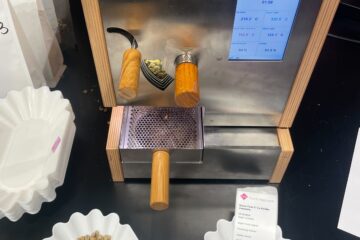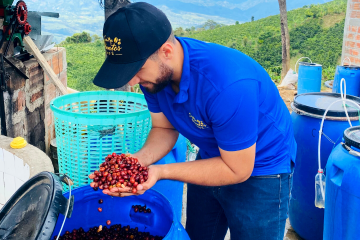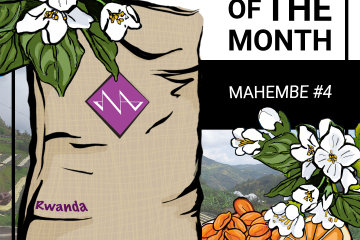I have tried to wrap up what we are currently doing on the sourcing side, and what to expect of this season’s harvest. ☺
In addition to Colombian arrivals it’s the time of year again when everything seems to happen at once, both in Centrals and East Africa. Ethiopia and Kenya is just done with the harvest, we are there and have started to cup, but it’s still early. El Salvador, Honduras and Costa Rica is in harvest right now. We will see some early samples now in Feb, but the majority of contracting will happen in March and onwards. This means that there will still be 3-4 months before we have a broader selection of these coffees in Europe. But, we will as always present pre-shipment samples earlier for those who wants to reserve coffees before arrival.
Colombia
- We have a great range of fresh coffees in stock that are cupping very well.
- About 2–3 more containers coming in both with some micro lots and several bigger volume lots above 50 bags like Bruselito etc below 10 USD.
We already have a good range of super nice coffees in stock harvested second half of 2017. This includes our first shipment ever of organic coffees from Tolima, and they really are up to our expectations. Read more about them here. The coffees from Juan Saldarriaga in Antioquia is about to be finalized and shipped. This is a range of different coffee than our usual Colombians, well priced and includes a lot of experiments on naturals and some crazy profiles. There is also some bigger lots coming from Huila, like Bruselito, and a good range of single producer coffees from the Tarqui project. They will be on our offer list soon!
All the coffees are built in to the concept where we pay really good premiums to the producers. It’s all traceable and we know what each producer is making on the coffees we buy. We are still focusing on certain regions, cooperatives and producer groups and continue to contribute to their increased income and better qualities.
Read more about our work in Colombia
El Salvador
- About 4 containers
- In harvest now, will start cupping in February, might get the first box in March/April
- Will be a good mix of 5- 50 bag lots of washed, naturals and honeys in the 10 – 12 USD price range as well as some volume lots of 50 bags + below 10 USD.
They are full on in production right now. We are mainly pre contracting and pre booking the different coffees and preps with the producers (At the time of writing Joanne is there cupping and selecting coffees). We will visit them and start cupping now in February. They continue to produce our coffees throughout March. First shipments should arrive end of March if all goes well.
We are getting coffees from our two producers there, Jasal and Los Pirineos. We will do even more micro lots of special preps of naturals and honeys as well as a good range of the washed and soaked coffees as before. We will also diversify the range in price and volumes more than previous years. We will have some lower to medium priced washed and Honey coffees that will be bought in 50 bags chunks and sold below 10 usd/kg. These should be great as blenders or for a medium priced seasonal filter. Besides micro lots we will also have some volume purchase of Naturals, like Buena Vista, that are also fairly well priced being a natural. Most of these coffees are from different Bourbon varieties as well as some small volumes of other cultivars.
Both of these producers and projects is owned by people that invest in environment and the local communities. They both have done huge investments in their mills for water treatment, recycling and less water usage as well as they have alternative programs for fertilization and compost. They pay their workers well, support them with health care programs. They have also contributed land and money to build clinics and schools.
Read more about our work in El Salvador
Honduras
- 1,5 – 2 containers
- In harvest now, will start cupping in February/March, might get the first box in April/May
- Will be mainly lots of 10 – 30 bags washed coffees in the 10 – 12 USD price range as well as some volume lots of 50 bags + below 10 USD.
They are also in the middle of the harvest right now. We will be there to cup the first outturns soon, and are aiming at getting some coffees landed in Europe April/May. We’ll focus on coffees from the Caballero family and will continue what we started with the smaller producers in Intibuca last year. Prices will be the same as last year, meaning around 11 USD/kg.
The Caballeros have many small to medium farms located around a central wet mill and processing facility. We will increase the purchase with them this year. There will be more micro lots of the same farm as before, like Mathilda, JR, Julia, El Campo etc, and maybe some new ones. Mainly fully washed and many of them shade dried. We will also here buy some bigger lots at slightly lower prices. This benefit both the producers and the clients/roasters. Prep and quality is the same, but they might be a mix from their different small farms, harvested in the same period. These coffees are mostly of the Catuai variety.
The Caballero family is known for being extremely active both on a community level and a promoter of quality coffee in Honduras. They have always stated that their most important investment is in the people involved at the farms and in the community. They have also changed to eco pulpers a long time ago, and have always preserved a lot of trees and forest on their land.
Intibuca is the project we started to work on last year. It’s an area with smaller individual farmers having 5-10 hectares each and their own small wet mills. They are not used to have a market that pay them premiums so this is a huge change for them. The coffees are tasting amazing, and we work through a person that help these farmers to increase and improve their preparation so they both get better qualities and a much better income from their farms. They are investing in drying tables and infrastructure and establish good quality protocols. This will be bought in small to medium sized lots from the single producers. The cultivars varies, but also here there is good amounts of Catuai. All coffees will be fully washed, many are dried on raised beds.
Read more about our work in Honduras
Costa Rica
- About 3 containers + 1 for the US
- In harvest now, but will go late until end April for the higher altitudes.
- Started cupping in February, might get the first box in April, and then the later part of harvest should arrive around June
- Will be a good mix of 10 – 30 bag lots of washed and honeys in the 11 – 13 USD price range as well as some volume of 50 bags + lots below 10 USD.
West Valley and Brunca is just ending the harvest, while our main focus area Tarrazú is more or less starting in the higher altitudes. We have cupped some coffees that are interesting, but are still waiting for the majority of our primary producers in Tarrazú to finish their first lots. We will aim at doing an early container from the first part of the harvest, and then two containers later on. Most of the producers we bought from last year will most likely be on our menu again.
Marianela, that works for us and is permanently based in Costa Rica, is there following up all the producers we work with. She’s cupping and are monitoring the quality and are giving constant feedback to the producers. Most of the producers are small to medium sized producers with their own small wet mill. They mainly produce honey coffees with different levels of mucilage and with different flavor profiles. The majority of the producers are located in really high altitudes in Tarrazú. A typical producer will have 5-10 hectares of coffee, an eco pulper and drying beds under cover. We are also buying some coffees from West Valley and are currently looking in to Brunca as a new region. They are doing different varieties, but mainly Caturra and Catuai. We do also buy Geishas etc. We are chasing both more good and clean naturals this year and more exotic varieties.
Read more about our work in Costa Rica
Ethiopia
- Plenty of coffees coming in to Europe between April and June.
- Mainly all coffees fully traceable and bought directly outside of ECX.
- Just ended the harvest, coffees are slowly moved to Addis now
- Started cupping the first part of harvest, very promising potential for this year
- Washed coffees will start coming in from April, Naturals from May
- Lot sizes will mainly be around 100 bags pr lot, some might be smaller
- Price range from 9,50 – 11 USD
The harvest just ended in the highest altitudes in Guji. We have started to cup coffees from the first part of the harvest and will finalize the first shipments soon. This means they should start coming in late March or early april. Even if we have our office in Ethiopia with staff, Kaya, our lab manager in Norway is also there for two months now the until mid-March. She will basically cup and pre select coffees continuously.
There will be a wide range of stand out coffees both washed and naturals this year. What we have cupped so far is tasting great considering it is still early in the season. Many of the Ethiopian coffees are also developing positively over time. So what’s tasting good now, will normally be extraordinary in some months.
The system is changing to the better in terms of an open and fully traceable supply chain. You can now buy coffees direct from any producer outside of ECX. I believe we will be buying all our coffees directly from producers through our exporters this year. We have been waiting for this and have built a very solid base of private producers and exporters that have trace ability systems, care for the local communities and the environment, as well as doing improved preparations and invest in quality.
Our main suppliers and projects are listed below:
Israel Degfa:
is a private producer/exporter and have about 18 washing stations and an export company. And also a brand new dry mill. We have built a fantastic and very solid relationship with him over the last 4 years. We are focusing on 4 of he’s washing stations and a new farm he’s got.
The washing stations are in Guji and Yirgacheffe. On these washing stations he have a registered and certified farmers for the Rainforest Alliance Certification. The importance for us in that matter is that he’s paying a second payment as a premium back to the producers. He’s also having separate lines for higher qualities. He have started a flotation system for cherries prior to processing. He have built covered drying facilities and he’s doing experiments on shade drying. He have also invested in ECO pulpers on two of he’s sites and started to produce honeys this year as a trial, still in descent volumes.
A lot of this is done in cooperation and dialogue with us and we have the priority for these coffees in general. We might even do vacuum packaging from him this year if all goes as planned.
Israel is also funding a private «NGO” where he is supporting and training thousands of farmers. The program is educating them on increased yield through better farmer practices. And help them plant other cash crops and vegetables to support the household alongside coffee. Parts of our payments to Israel goes to this projects as he allocates 10% of he’s profits annually for this.
The RFA Sites:
- Mokonisa Bulga Washing station. Washed, honeys and naturals (West Arsi, Nensabo, Oromia)
- Mokonisa Rare Washing station. Washed, honeys and naturals (Guji, Oromia)
- Adola Washing station. Washed, honeys and naturals (Guji, Oromia)
- Boje Washing station. Washed sun dried, shade dried and naturals (Yirgacheffe, Kochere, Gedeo)
- Farm in Bale, only producing naturals. (Guji, Oromia)
Other privately owned washing stations/farms where we buy directly now and outside of ECX. These are washing stations we have bought from in the past based on amazing performance and flavor.
By Faisel Abdosh:
Nensebo Washing station
Werka washing station
Gigesa Washing station
Various private owners:
- Banko Gutiti washing station
- Deri Kocha washing station
- Silinga washing station + private farm in Negelle Gorbitu (processed at Sillinga)
- Baya Chenchesi – private farmer group doing naturals in Negelle Gorbitu
- Dimtu Haro – private farmer doing naturals in Guji
Hunkute, Bokasso, Duromina, Biftu Gudina ++
Are washing stations under the Sidamo Cooperative Union in the south and Keta Muduga Union in the west, mainly the Agaro region. We have been buying these coffees for 6 years at good premiums. We know they are passing parts of the premiums back to the producer. They have developed a lot over the years. The washing stations are located at around 2000 MASL, an have always had a very distinct and unique profile. They have also used Technoserve on the sites to manage quality, traceability systems as well as improved the environmental impact.
Read more about our work in Ethiopia
Kenya
- About 3 -4 containers + 1 for the US
- Started cupping in January, might get the first box in April, then the later part of harvest in May/June
- Will be a good mix of washed AA, AB and PB in the 13 – 17 USD price range as well as maybe a new concept with a different screen size at around 10 USD/kg.
- Lot sizes will be from 20 – 40 bags.
Seems to be on schedule too. They finished most of the harvest around Christmas. There is already good amounts coming in from the Cooperatives to the mill, and we have started to cup coffees some weeks ago. We are currently contracting coffees based on what we found from our first buying trip in January. We might have some arrivals already by end of March or early april, but the main parts will arrive in May. What we have seen of quality so far is very promising, both AA and AB cups great. Seems to be lower volume of PB this year than last year. The prices are relatively high compared to this time of year last season. They might change over the next months. We will buy a good mix, and often the AA, AB and PB from the same lot (outturn) from the same Coops. We are currently getting offers around from the producers around 4,80 – 5,80 for very nice scoring AA’s. These will normally be in a range of 15 – 16,50 USD/kg. Great AB’s is about 1-1,50 USD lower.
We are mainly buying coffees outside the auction. For many of the names we have a priority from the exporters on certain Cooperatives and factories. These are mainly managed by farm management companies supporting the farmers. We generally get to see samples of these before they potentially go in to auction, or the exporters buy them on our behalf up front as they know they have the market for them. The prices are normally above the auction prices as you have to give them an additional premium as they often like to gamble from week to week on higher price levels. Most of these Cooperatives are also generally performing well and know they have additional market value. But they are also known for paying great percentages of the premiums back to the smallholders. Many of the coops are returning purchases for us for many years. Factories like Kamwangi, Gathaiti, Kainamui, Tegu, the Baragwi Cooperative etc are paying some of the best premiums back to the producers. We are also planning to build in some quality programs and invest in some of them. We started this conversation regarding Kamwangi and the Baragwi Coop some years ago. But in the meantime there has been some challenges there that should be sorted now. I will probably meet with the Coops in early March.
If you need more resources to plan your purchasing for the year we recommend having a look at the Coffee Calendar, and of course, if you want more help we offer free Purchase Planning.



0 Comments